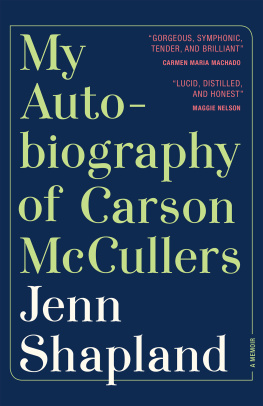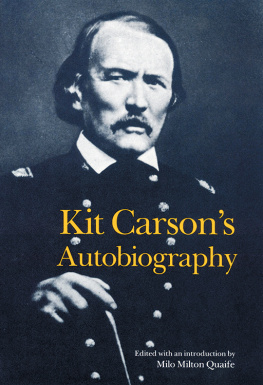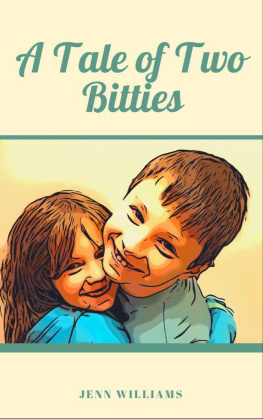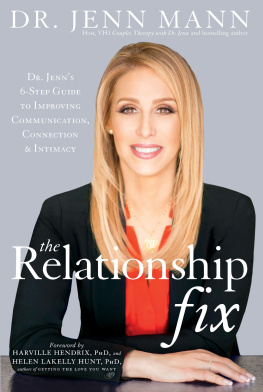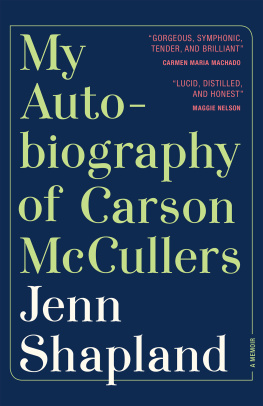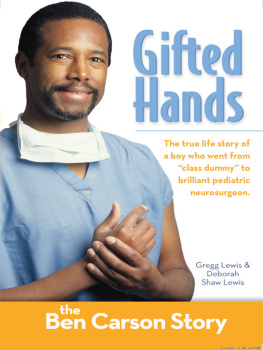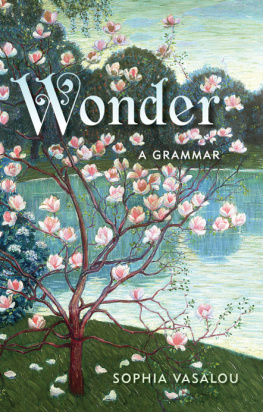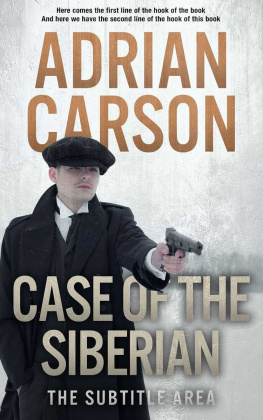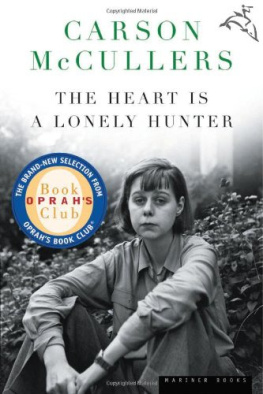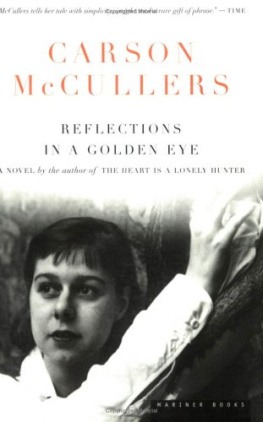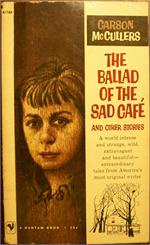Jenn Shapland - My Autobiography of Carson McCullers
Here you can read online Jenn Shapland - My Autobiography of Carson McCullers full text of the book (entire story) in english for free. Download pdf and epub, get meaning, cover and reviews about this ebook. year: 2019, publisher: Tin House Books, genre: Non-fiction. Description of the work, (preface) as well as reviews are available. Best literature library LitArk.com created for fans of good reading and offers a wide selection of genres:
Romance novel
Science fiction
Adventure
Detective
Science
History
Home and family
Prose
Art
Politics
Computer
Non-fiction
Religion
Business
Children
Humor
Choose a favorite category and find really read worthwhile books. Enjoy immersion in the world of imagination, feel the emotions of the characters or learn something new for yourself, make an fascinating discovery.
- Book:My Autobiography of Carson McCullers
- Author:
- Publisher:Tin House Books
- Genre:
- Year:2019
- Rating:5 / 5
- Favourites:Add to favourites
- Your mark:
- 100
- 1
- 2
- 3
- 4
- 5
My Autobiography of Carson McCullers: summary, description and annotation
We offer to read an annotation, description, summary or preface (depends on what the author of the book "My Autobiography of Carson McCullers" wrote himself). If you haven't found the necessary information about the book — write in the comments, we will try to find it.
My Autobiography of Carson McCullers — read online for free the complete book (whole text) full work
Below is the text of the book, divided by pages. System saving the place of the last page read, allows you to conveniently read the book "My Autobiography of Carson McCullers" online for free, without having to search again every time where you left off. Put a bookmark, and you can go to the page where you finished reading at any time.
Font size:
Interval:
Bookmark:

My Autobiography of Carson McCullers
Jenn Shapland

For your Carson
In the recognition of loving
lies an answer to despair.
AUDRE LORDE,
Zami: A New Spelling of My Name
Contents
Due to copyright constraints, several documents, including letters, telegrams, and a set of transcripts made from Carson McCullerss recorded therapy sessions, have been referenced without direct quotations throughout this book.
Reeves asked Carson if she was a lesbian on the front porch of Carsons house on Stark Avenue, after everyone had gone to bed. I picture them on a swing, though I know for a fact that no such swing exists. Carson answered with a swift denial, wished aloud that she wasnt one, then expressed plain uncertainty.
I was the only patron in a small university archive in Columbus, Georgia, when I came across this exchange in a typed transcript dated March 1958. The transcript records Carsons fifth therapy session with Dr. Mary Mercer, whom she visited for help with writers block. I read the question again. In her recollection, Carson told Reeves that she had loved a woman named Vera, another named Mary Tucker, but she wasnt sure what he referred to when he said lesbians. She asked him, as though lesbians might be a club that she could consider joining, or an unfamiliar species she might study: How do lesbians behave? Where do they live? How do they interact?
Despite Carsons status as maybe-lesbian, Reeves asked Carson when they would be married. She was nineteen.
Carson McCullers, when she is remembered, is remembered as a novelist who grew up in Columbus, Georgia, moved to New York in her twenties, and spent the rest of her life writing about misfits in the American South. Her characters are mute or too tall or black or queer and almost always lonely and out of place in a conservative small town that looks a lot like her own. In 1940, her first novel, The Heart Is a Lonely Hunter , brought her fame at twenty-three. Her books were made into films and Broadway plays. One of her best friends was Tennessee Williamsshe called him Tennand she feuded with copycat Truman Capote for years. She married the same man, Reeves McCullers, twice, and is rumored to have chased after women. She was often drunk, chronically ill, and, like so many of her era, she died young. If youve heard of her, youve probably heard some version of this.
To tell her own story, a writer must make herself a character. To tell another persons story, a writer must make that person some version of herself, must find a way to inhabit her. This book takes place in the fluid distance between the writer and her subject, in the fashioning of a self, in all its permutations, on the page.
I wasnt expecting love letters. The paper was browned with age and wrinkled at the edges. Annemaries handwriting filled the page, bearing hard to the right and often spilling back up the left-hand margin with last additions. I read through clear Mylar sleeves, too intern-nervous to remove the pages from their housings.
April 10th, at night
Carson, child, my beloved, you know that, leaving the day after tomorrow, feeling half-afraid and proud, leaving behind me all I care for, once again, and a wave of love
I looked up at the rows of manuscript boxes that surrounded me, mind humming, face flushed. Did that mean what I thought it meant? What did she mean, love? Instinctively, I listened for anyone who might be coming. Hearing only the ticking of the sliding electric shelves, I read on. To Carson, Annemarie recalled talking as we did, you and I, at that lunch time, you remember, at the corner near the Bedford Hotel, with milk and bread and butter, ages ago.
Four years before I visited the Georgia archives housing Carsons transcribed therapy sessions, before I knew much more of Carson than her name, I was an intern at the Harry Ransom Center, a giant collection of writers and artists books and papers on the University of Texas campus in Austin. The gig was a kind of coup: it got me out of teaching for two years while I was a graduate student and gave me unfettered access to the papers and belongings of major writers.
On each day of my two years at the center, I came into the shared intern office and answered queries from scholars about their research from a stack of mail by the door. Most were boring. About half of them were about either David Foster Wallace or Norman Mailer. (My favorite find was a series of letters one of Mailers mistresses had written him with the salutationsumming up my own feelings Dear American Shithead .) One day in early February 2012, a scholar wrote asking for letters between Annemarie Clarac-Schwarzenbach, whose name was utterly unfamiliar, and Carson McCullers, whose book titles had always struck a chord with me. The Heart Is a Lonely Hunter . Like, same . But Id never gotten around to reading any. Books seem to find me when Im ready for them, or else I abandon them. I took the freight elevator down to the icy basement manuscript room, pulled the correspondence folderit was 29.1, I still recalland started reading it right there in the stacks.
Annemaries language in her letters to Carson is intimate, suggestive, or I read it that way. You remember . I had received letters like these. I had written letters like these to the women Id loved. It was very little to go on, and yet I felt an utter certainty: Carson McCullers had loved women. Or at least, this woman had loved her. Immediately, without articulating a reason, I wanted to know everything about them both. I brought the folder upstairs to my shelf in the intern office, hurried to my three oclock reference-desk shift, and started Googling. This was research, I rationalized; part of the job. Annemarie, I discovered, was a Swiss writer, photographer, silk heiress, and known lady-killer who spent time in New York in the 1930s and early 40s.
In folder 29.4 I found eight letters from Annemarie to Carson, but none of Carsons replies. One has the heading On the Congo River, Sept. 1941 , another On the boat, from Portuguese Angola to Lisbon . After counting the pages for the scholar and replying to his request, I took the folder downstairs and tucked it back into its box. Later, I would keep stacks of Carsons books and manuscripts on my shelf in the office, but at that moment I didnt feel entitled to have these letters so nearby. I had, however, transcribed some of them into an email that I sent to myself. The scholar never ordered the scans.
Annemaries handwriting is so small and insistent that the letters read long, though often they cover only the front and back sides of a single sheet. Her letters, like mine, are overwrought, wrung with feeling and a need to declare it in writing. In the first letter, it seems as if she is ending her relationship with Carsongently, but firmly. She writes from Zurich, having already left the country:
Thank you forever... Carson, remember our moments of understanding, and how much I loved you. Dont forget the terrific obligation of work, be never seduced, write, and, darling, take care of yourself. As I will. (I wrote, in Sils. A few pages only, you would like them), and never forget, please, what has touched us deeply.
Your Annemarie, with all my loving affection.
The love she describes is bound up in writing, in creative work taken seriously by women. I think this part was just as striking to me as their romance, and now it reminds me of the feeling that Audre Lorde describes in her autobiography, Zami , when she first finds herself among a group of creative, queer women: I felt myself pass beyond childhood, a woman connecting with other women in an intricate, complex, and ever-widening network of exchanging strengths. Like my own letters from my late teens and early twenties, Annemaries letters are transmissions from one confused woman to another, an attempt to articulate a self she had not yet fully become. Rereading the letters I wrote during this period, I can hear myself still believing that one day soon my identity might resolve into something firm, fixed. I was waiting for my face to thin out, my hands to age. Other than my own, I had never read love letters between women before. For all Annemaries and Carsons unfamiliarity to me, and their separation from me in time and space, I deeply understood them on the page.
Font size:
Interval:
Bookmark:
Similar books «My Autobiography of Carson McCullers»
Look at similar books to My Autobiography of Carson McCullers. We have selected literature similar in name and meaning in the hope of providing readers with more options to find new, interesting, not yet read works.
Discussion, reviews of the book My Autobiography of Carson McCullers and just readers' own opinions. Leave your comments, write what you think about the work, its meaning or the main characters. Specify what exactly you liked and what you didn't like, and why you think so.

